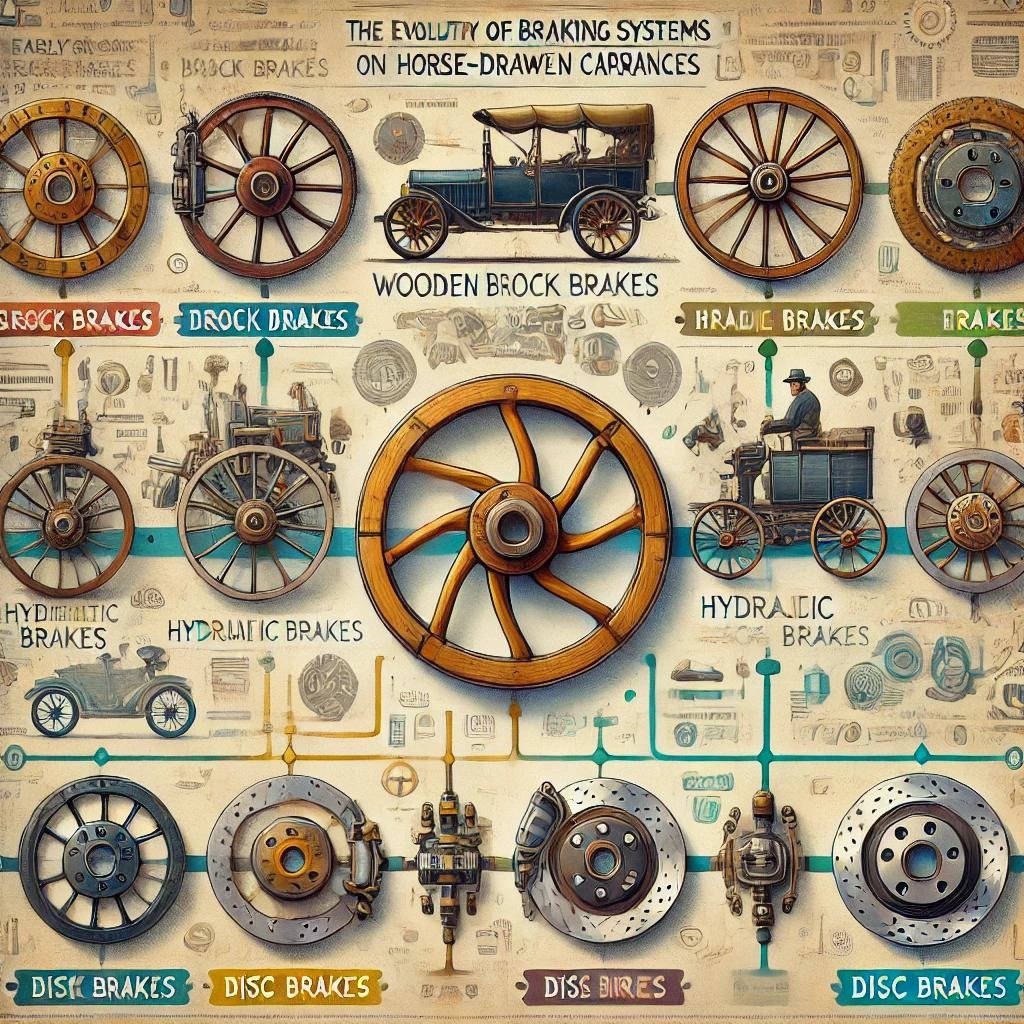The Evolution of Braking Systems: From Drum Brakes to Modern ABS - Brake Repair and Replacement in Lincoln
The Evolution of Braking Systems: From Drum Brakes to Modern ABS
The braking system is one of the most critical components of any vehicle, ensuring safety and control in all driving conditions. Over the years, braking technology has evolved dramatically, moving from simple mechanical setups to the advanced systems we rely on today. This evolution has not only improved performance but also significantly enhanced vehicle safety.
At Andrews Car Centre in Lincoln, we specialize in brake pads and disc replacements, ensuring your car benefits from the latest advancements in braking technology. Here’s a look at the fascinating history of braking systems and how they’ve shaped modern vehicles.
The Early Days: Mechanical Brakes and Wooden Wheels
In the late 19th and early 20th centuries, the first cars used basic mechanical braking systems. These relied on levers or cables to apply pressure to wooden blocks, which pressed against the wheels. While innovative at the time, these brakes had severe limitations:
- Low stopping power: Wooden brakes were ineffective at high speeds.
- Durability issues: The wood would wear out quickly, requiring frequent replacements.
- Inconsistent performance: Mechanical systems were prone to failure due to wear and slack in cables.
The Introduction of Drum Brakes
The first significant breakthrough came with the invention of drum brakes in the early 1900s. Louis Renault is credited with developing the drum brake system, which quickly became the industry standard.
- How they worked: Drum brakes used a set of shoes inside a drum attached to the wheel. When the brake pedal was pressed, the shoes expanded to create friction against the drum.
- Advantages: This design provided more reliable stopping power and was less prone to wear than wooden brakes.
- Limitations: Drum brakes could overheat during heavy use, leading to “brake fade,” which reduced their effectiveness.
The Rise of Disc Brakes
Disc brakes emerged in the mid-20th century as a more efficient and durable alternative to drum brakes. Initially used in racing cars, they became widely adopted in consumer vehicles by the 1950s and 1960s.
- How they work: Disc brakes use a caliper to squeeze brake pads against a spinning disc (rotor) attached to the wheel. This friction slows the wheel down effectively.
- Advantages:
- Better heat dissipation, reducing brake fade.
- Superior performance in wet conditions.
- Easier to maintain and inspect.
At Andrews Car Centre in Lincoln, we provide professional disc brake and brake pad replacements, ensuring your vehicle benefits from the superior performance of this technology.
Anti-Lock Braking Systems (ABS): A Game-Changer
In the 1970s and 1980s, ABS revolutionized braking by preventing wheel lock-up during emergency stops. This system uses sensors and a computer to modulate braking pressure, allowing the driver to maintain steering control while braking.
- How ABS works:
- Sensors detect when a wheel is about to lock.
- The ABS module reduces brake pressure momentarily, then reapplies it rapidly to prevent skidding.
- Benefits of ABS:
- Reduced stopping distances on slippery surfaces.
- Improved vehicle control during panic braking.
Today, ABS is a standard feature in most vehicles, and our team at Andrews Car Centre ensures your entire braking system, including ABS components, is in top condition during every service.
Modern Braking Innovations
Braking technology continues to evolve with advanced systems designed to enhance safety and performance:
-
Electronic brakeforce distribution (EBD)
- Distributes braking force to individual wheels based on load and traction.
-
Brake assist systems (BAS)
- Detects emergency braking situations and applies maximum braking force to reduce stopping distances.
-
Regenerative braking (in hybrid and electric vehicles)
- Captures energy lost during braking to recharge the vehicle’s battery.
-
Autonomous emergency braking (AEB)
- Uses cameras and sensors to detect obstacles and apply the brakes automatically if a collision is imminent.
These innovations highlight the importance of keeping your vehicle’s braking system up to date, and our services at Andrews Car Centre in Lincoln are designed to ensure your car benefits from these advancements.
Why Choose Andrews Car Centre for Your Braking Needs?
The evolution of braking systems has brought remarkable improvements in safety and reliability, but it has also made modern systems more complex. At Andrews Car Centre, we combine expertise and advanced tools to provide comprehensive brake services, including:
- Brake pad and disc replacements: Using high-quality parts, we ensure optimal braking performance and durability.
- ABS and electronic system inspections: We diagnose and maintain advanced braking systems for maximum safety.
- Brake fluid checks: Proper fluid levels and quality are essential for effective braking.
Our professional team in Lincoln is dedicated to keeping your brakes in peak condition, whether your car is equipped with traditional disc brakes or modern electronic systems.
The Importance of Regular Brake Maintenance
As braking systems have evolved, so too has the need for regular maintenance to ensure they operate correctly. Here’s why it’s essential:
- Safety: Well-maintained brakes reduce stopping distances and improve control in emergencies.
- Cost savings: Regular inspections help catch wear and tear early, preventing costly repairs.
- Compliance: Faulty brakes can lead to MOT failures, which is why a thorough inspection is crucial.
Book Your Brake Service at Andrews Car Centre in Lincoln
From the earliest mechanical brakes to today’s sophisticated ABS systems, the evolution of braking technology underscores the importance of keeping your vehicle’s brakes in top condition. At Andrews Car Centre, we offer expert brake pad and disc replacements and full braking system inspections to ensure your safety on the road.
Contact us today to schedule a brake check or service. With our experienced team and advanced equipment, you can drive confidently, knowing your braking system is in expert hands.

